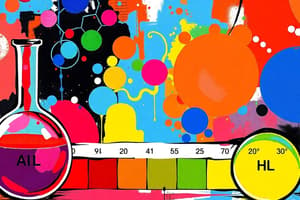Podcast
Questions and Answers
Why are acids called proton donors?
Why are acids called proton donors?
Acids have the tendency to lose H+ atoms, which are also referred to as protons because of their positive charge.
Why can't hydrogen ions exist by themselves?
Why can't hydrogen ions exist by themselves?
Because of the oxygen.
How can you tell if a compound is an acid?
How can you tell if a compound is an acid?
Acid formulas start with an H and form H+ ions.
What is pH?
What is pH?
What are some examples of acids? (Select all that apply)
What are some examples of acids? (Select all that apply)
Flashcards are hidden until you start studying
Study Notes
Acids and Their Properties
- Acids are known as proton donors due to their ability to lose hydrogen ions (H+), which have a positive charge.
- They are also described as electron acceptors, interacting with bases that act as proton acceptors or electron donors.
Hydrogen Ion Existence
- Hydrogen ions cannot exist independently in solution because they react with water molecules, forming hydronium ions (H3O+).
Identifying Acids
- Compounds identified as acids typically begin with the letter 'H' in their formulas.
- Acids produce H+ ions in solution, while bases, which end with 'OH', generate OH- ions.
Understanding pH
- pH is a quantitative measure indicating the concentration of hydrogen ions in a solution, determining its acidity or basicity.
Examples of Acids
- Common examples of acids include:
- Phosphoric Acid
- Hydrochloric Acid
- Sulphuric Acid
Studying That Suits You
Use AI to generate personalized quizzes and flashcards to suit your learning preferences.





